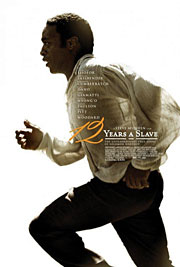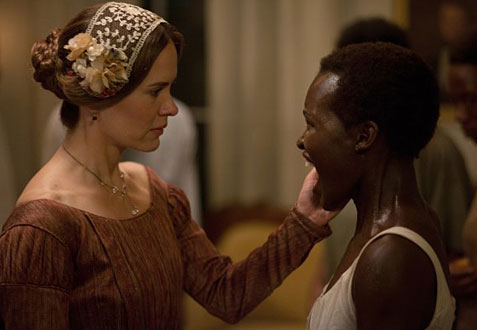Movie Review: “12 Years a Slave”

If the critics at this year’s Toronto International Film Festival had their way, “12 Years a Slave” would win the Academy Award for Best Picture, despite the fact that there are still plenty of Oscar hopefuls yet to be released. That kind of short-sightedness and hyperbolic mentality is exactly what’s wrong with the dog and pony show we call awards season, because while Steve McQueen’s historical drama may tick several of the requisite boxes for a typical Oscar-winning movie, it’s far too early to make that call. You can praise the film’s realistic depiction of slavery all you like, but just because “12 Years a Slave” is hard to watch doesn’t necessarily mean that it’s deserving of the top prize.
Based on the 1853 memoir of the same name, the film recounts the tale of Solomon Northup (Chiwetel Ejiofor), a free black man living with his wife and children in Saratoga, New York in 1841. Well-educated and a talented violinist, Solomon is invited to Washington, D.C. by a pair of circus promoters who offer him a lucrative job playing at one of their shows. Upon arriving in the capital city, Solomon is wined and dined by the two men, only to awaken the next morning to find himself shackled and charged as a fugitive slave from Georgia. Despite his claims that he’s a free man, Solomon is wrangled up with other “fugitives” and shipped to a slave trader in the South, who then sells him to a kindly plantation owner named William Ford (Benedict Cumberbatch). But when Solomon causes trouble with one of Ford’s white employees, he’s sold again, this time to Edwin Epps (Michael Fassbender), a decidedly more malicious owner with a reputation for breaking the spirits of any slave under his rule.
“12 Years a Slave” is without a doubt McQueen’s most accessible film to date. Though it boasts the same gorgeous cinematography from longtime collaborator Sean Bobbitt, it’s not as experimental as his first two films, instead opting for a more straightforward narrative. Unfortunately, the movie isn’t without its faults, and John Ridley’s screenplay is chief among them, riddled with bad dialogue that’s made only marginally better by the ensemble cast. Some of the actors treat it like they’re reading Shakespeare (Paul Dano is the worst offender), and the theatricality of their performances weakens what would otherwise be powerful scenes. The number of high-profile cameos is also incredibly disconcerting, because while it’s nice to see actors like Paul Giamatti and Brad Pitt in smaller roles, it pulls you out of the movie. Of the supporting cast, only Fassbender gets a part with any real meat on it, although Sarah Paulson leaves quite the impression as Epps’ equally cruel wife.
As a result, Chiwetel Ejiofor is left to shoulder most of the weight, and he performs admirably in the lead role. Ejiofor is one of those actors that’s been on the verge of breaking out for years, and he’s finally been given the chance to showcase his talents here with a brilliant performance that not only holds the movie together, but outshines it completely. Without Ejiofor, “12 Years a Slave” would be just another mediocre drama about slavery in the antebellum South. McQueen’s film is way too long for such a thinly scripted story, hammering you with the same ideas over and over to the point of exhaustion. It’s almost too in-your-face at times – less concerned with the character’s own emotional journey than piling on the white guilt through some of the most vile, one-dimensional caricatures imaginable – and though Solomon Northup’s story is one that deserves to be told, it could have benefited from a little restraint.
Related Posts
Posted in: Entertainment, Movie Reviews, Movies
Tags: 12 Years a Slave, Chiwetel Ejiofor, Michael Fassbender, Steve McQueen
















